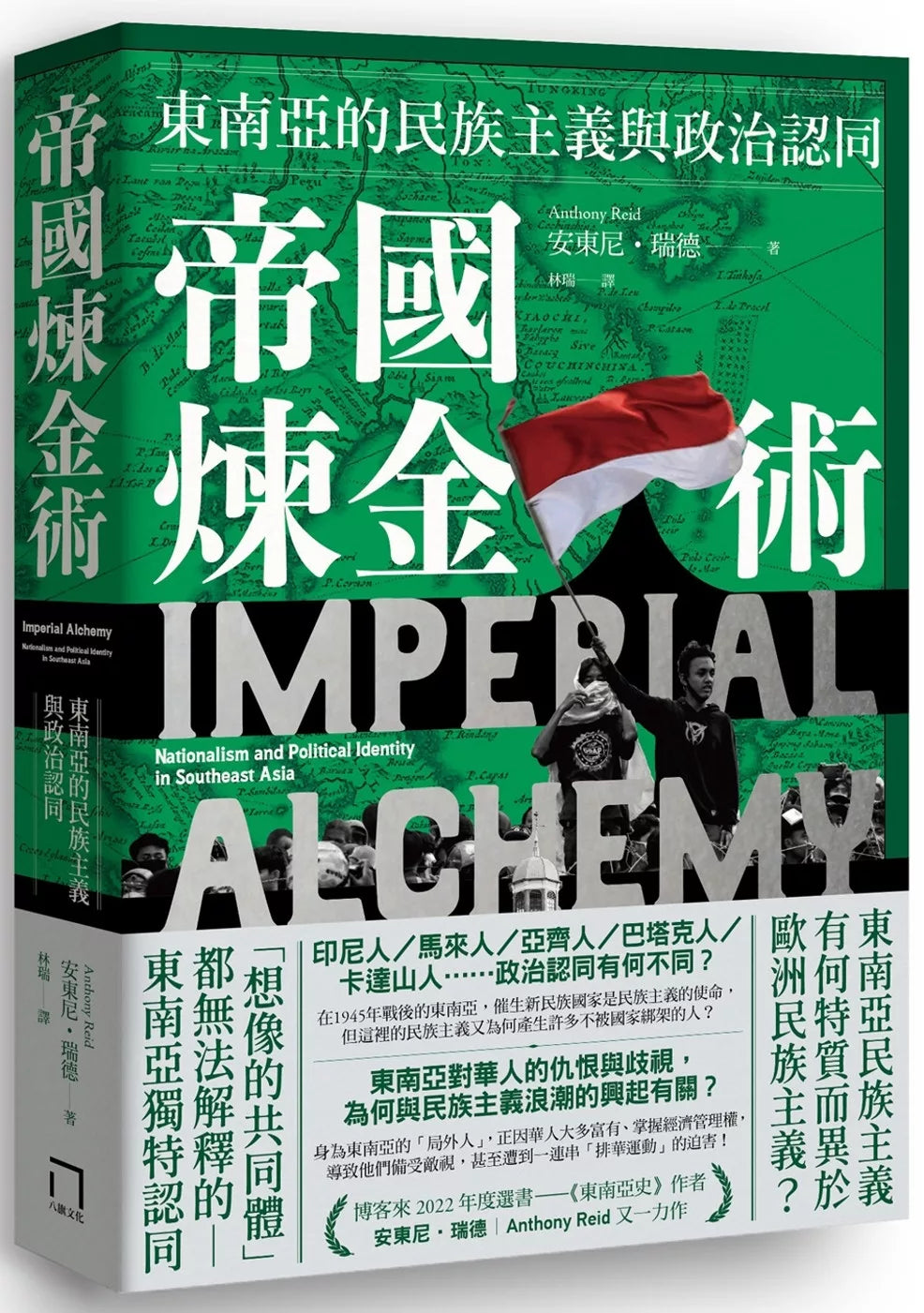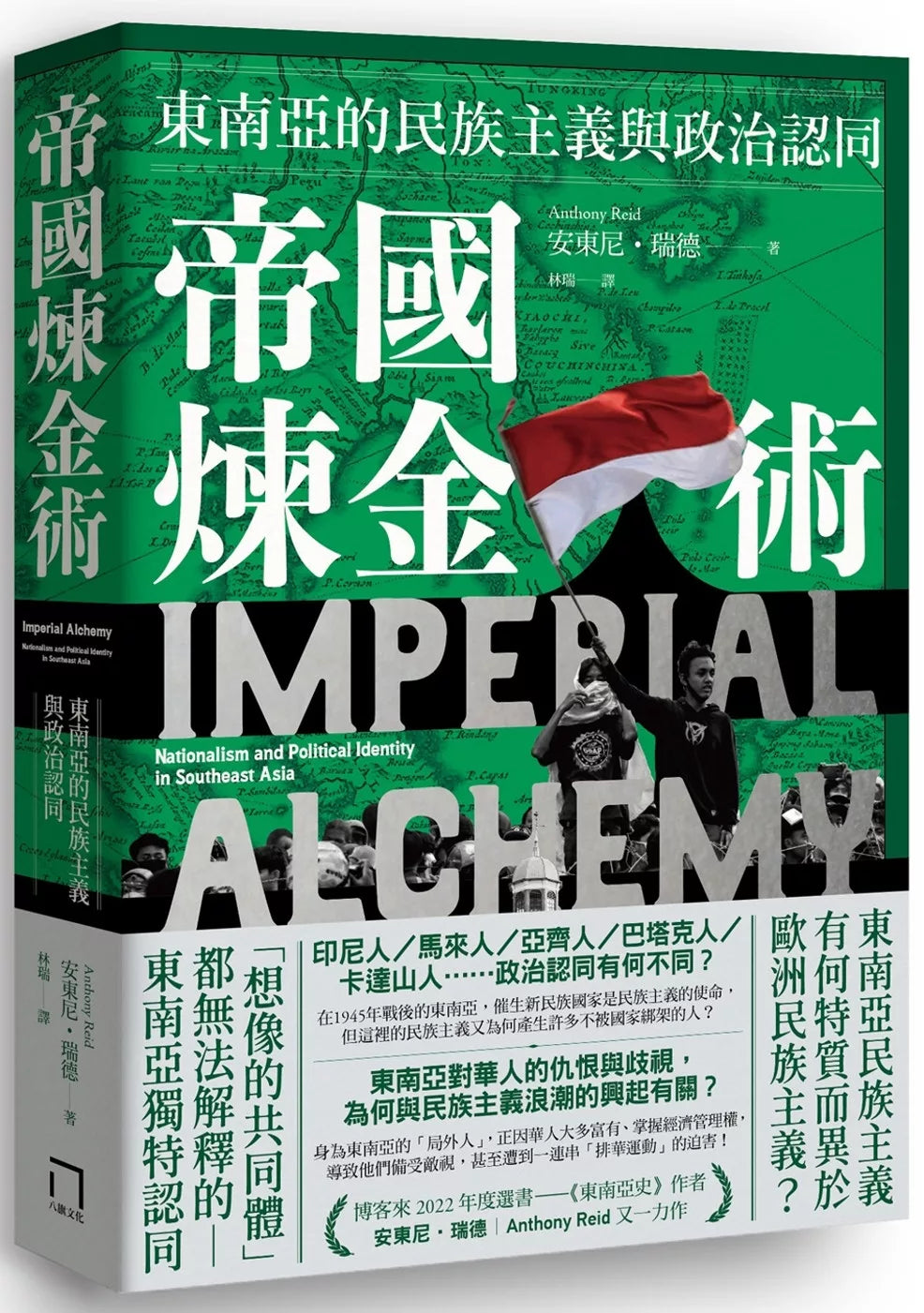1
/
of
1
Imperial Alchemy
Imperial Alchemy
Anthony Reid Lin Rui 译
Regular price
$32.99 USD
Regular price
Sale price
$32.99 USD
Unit price
/
per
Low stock
Couldn't load pickup availability
About Book
About Book
Imperial Alchemy: Nationalism and Political Identity in Southeast Asia
"Nationalism is the greatest alchemist.Treating the various colonial groups under the rule of the colonial empire as "scrap metal"
"It has been transformed into a nation-state that is like 'gold'." --Anthony Reid, an authority on Southeast Asian history, winner of the Asian version of the Braudel Award for Outstanding Contribution to the American Society for Asian Studies, and a Fellow of the Australian Academy of the Humanities.
Following Books.com's annual selection, "A History of Southeast Asia: Diverse and Unique, a Critical Crossroads," this is another masterpiece. ★★The only Chinese translation in the world, featuring a new preface for the Taiwanese edition★★
★★In-depth analysis of the diversity and uniqueness of ethnic identity in Southeast Asia in the 20th century★★
Indonesians/Malays/Aceh/Batak/Kadazans…what are the differences in political identity?
In post-war Southeast Asia in 1945, the mission of nationalism was to create new nation-states.
But why does nationalism here produce so many people who are not kidnapped by the state?
Why is hatred and discrimination against Chinese people in Southeast Asia related to the rise of nationalism?
As "outsiders" in Southeast Asia, the Chinese are mostly wealthy and have control over economic management.
This led to them being looked down upon and even persecuted in a series of "anti-Chinese movements"...
Even the "imagined community" cannot be fully explained.
To understand the characteristics of Southeast Asian nationalism that are different from European nationalism,
You must first understand what "Southeast Asian unique identity" is!
★The key to understanding the diversity of modern Southeast Asian countries lies in nationalism!
How did European nationalism integrate with Southeast Asia's traditional ethnic cultures to establish various nation-states in the 20th century? Why do large nation-states inherited from colonial empires, such as Indonesia and Malaysia, contain a variety of other ethnic groups with distinct identities? What is the unique nature of modern Southeast Asian ethnic identities, forged through nationalism?
Anthony Reid, a leading authority on Southeast Asian studies, offers a deeply original analysis of this difficult issue in this book. Reid integrates various nationalist theories, including the "Imagined Community," with empirical research from historical and anthropological perspectives, offering a unique perspective that differs from previous research:
★The uniqueness of Southeast Asia’s ethnic identity lies in the “ethnic nationalism” that is the fusion of its own historical traditions and the structure of foreign colonial empires!
In his classic work, A History of Southeast Asia, Reid proposed that ancient Southeast Asian societies were characterized by linguistic diversity, weak statehood, and a focus on trade. In this book, he argues that these ancient characteristics are more reflected in a cultural type of "state aversion": Southeast Asia abhors bureaucracy and legal systems, values kinship and religious rituals, and the basis of social cohesion lies in ethnic bloodlines rather than state power.
Southeast Asia's traditional emphasis on ethnicity did not disappear with European colonial rule and modernization. Instead, it emerged as the ruling structures, industrial bases, and educational systems that emphasized homogeneity established by colonial empires, combined with the intense anti-colonial sentiment of national shame, became the driving force behind the development of self-awareness and national identity and the overthrow of colonial rule. The author notes that "in the process of shaping political identity, the role played by long-standing historical traditions is often more important than documented."
★ "Ethnic nationalism" manifests itself among ethnic minorities with different cultural backgrounds, leading to the formation of their own unique self-identity, that is, "people who are not held hostage by the state"!
This book reviews the development of nationalism in Southeast Asia from the colonial period to the present day, further illustrating this through case studies of the Chinese, Malays, Acehnese, Batak, and Kadazan. The author ultimately argues that Southeast Asia's ancient cultural diversity and emphasis on ethnicity are both fundamental forces driving the formation of national identity and the fundamental reason why nationalism differs from that found in Europe or East Asia.
The Chinese, whose "ethnic traditions" stem from their cultural identity in mainland China, have consistently been labeled "outsiders" and alienated in Southeast Asia. This book offers a unique and in-depth analysis of the similarities and differences in the identities of the Chinese in Southeast Asia, including those in the Philippines, the Baba Chinese in the Malay Peninsula, and the Chinese in Indonesia; their roles in the formation of various nation-states; and the reasons why anti-Chinese sentiment, similar to the anti-Semitic movement in Europe, has emerged in Southeast Asia.
Through the theoretical lens of "ethnic nationalism," the following introduces various specific cases of ethnic formation in Southeast Asia:
With the exception of the Malays, these cases all involve ethnic minorities in Southeast Asia. They have all developed a strong sense of identity over the course of history, drawing on their long-standing "ethnic traditions"—religious and cultural—together. Although these minorities have failed to establish fully independent sovereign nation-states like Malaysia and Indonesia, they have consistently maintained distinct national identities to this day.
▌Dutch travelers' impressions of the Chinese in Southeast Asia in the 16th century
"The Chinese in Banten lived in a separate zone (outside the walled city) surrounded by a strong fence and a ditch. Their houses were of the finest quality. They were very frugal and did everything to make money, which gave them a very respectable appearance... The Javanese rejoiced when they saw a Chinese being led to his execution, and the Chinese rejoiced when they saw a Javanese being executed."
》》Book Points:
For centuries, the business-savvy Chinese of Southeast Asia, with their strong sense of "Chinese cultural" identity, have struggled to integrate into local society or establish a nation. In the era of mass democracy in the 20th century, they have repeatedly become targets of local ethnic hatred, sparking numerous "anti-Chinese movements."
▌1945, British colonists' survey report on the Malays
"The Malays vehemently resent being called 'Malaya'. 'Malay' refers not just to traditional Malay sultans, or even their supporters, but to a significant ethnic group in the world. Therefore, every Muslim who speaks Malay in their daily lives, whether or not they are descendants of the Minangkabau or claim to be, is a Malay."
》》Book Points:
"Malay" was originally a term for the perspectives of outsiders, not the self-concept of the native Malays. However, under British colonial rule, the term "misinterpretation" ultimately led to the formation of a concept of "race" based on ethnic roots, bloodline, and language, which is the foundation of today's "Malay identity."
▌1945, the Aceh rebels’ declaration of war
"Every member of our nation has united under the great leader Sukarno, awaiting instructions and ready to act. We firmly believe that this is a sacred struggle called 'jihad'. Therefore, compatriots, believe that this is a continuation of the Aceh struggle led by the late Tiangu Di Tillo and other national heroes."
》》Book Points:
The Acehnese, living along the western coast of Sumatra, once established a powerful Islamic commercial empire and for centuries steadfastly resisted Dutch colonial rule. Although incorporated into the newly born Indonesia after World War II, their long-standing national memory and tradition of resistance prompted the Acehnese to pursue independence, leading to repeated civil wars and conflicts with Indonesia.
▌In the 16th century, Portuguese historians’ research records
"In ancient Sumatra, there were two kinds of people: the Moros and the Kintias. The Moros were pagan natives, while the Kintias were Muslim foreigners who came for trade. Their power expanded rapidly, and within 150 years, they had established themselves as kings. The pagan natives left the coastal areas of Sumatra and took refuge in the inland mountains, where they remain today. Among them, the tribe living in the highlands facing Malacca is called the Batak. They are the most barbaric and warlike people in the world, and they practice cannibalism."
》》Book Points:
The Batak people, scattered across the inland highlands of Sumatra, were originally independent, primitive tribes. However, with the "civilizing" brought about by modern colonial rule, they "re-invented" a comprehensive Batak ethnic identity in the early 20th century. This is the historical foundation for the Batak people to consolidate their identity through "multi-layered identity" in Indonesia today.
1953, editorial in the Sabah Times, North Borneo
"I say this both to respond to the growing sense of national pride among the Kadazan people and because we know they want to have their own name, not a label imposed on them by outsiders without their consent... I feel that if the Kadazan people truly want to establish a unified national identity, they should strengthen their common language connection, and the best way to strengthen this connection is to find a solution to the problem of language standardization."
》》Book Points:
The Kadazans, living in northern Borneo, are a fusion of coastal inhabitants and inland highland tribes. These two groups originally had very different cultural traditions, but through the tool of modern colonial rule - the promotion of a monolingual education system - they unexpectedly combined and established a common ethnic tradition and self-identity.
Professional acclaim: "The Alchemy of Empire" is a true masterpiece. Drawing on Southeast Asian history, this book examines how the "homogenization of ideologies" that underpins modern states transforms diverse traditional identities into various forms of nationalism and political identity. As one of the most authoritative historians of Southeast Asian studies, Reid deeply traces the evolution of political identity across Southeast Asia from the colonial period to the present day, demonstrating both theoretical precision and rich detail. This book represents a significant contribution to the study of nationalism and ethnic identity in Southeast Asia. —Jacques Bertrand, Professor of Political Science at the University of Toronto, Canada: This book is highly illuminating. The Alchemy of Empires meticulously integrates the historical experience of Southeast Asia, encompassing peninsular and island regions, from pre-colonial to colonial periods, offering a fresh perspective on the region's diverse and unique political identities. This book is a masterpiece of originality and intellectual breadth, and I believe that every reader will leave with a broader understanding of Southeast Asia thanks to Reid's contributions. —Victor Lieberman, Anthony Reid, Professor of Asian and Comparative History and Wallenberg Professor of Asian and Comparative History at the University of Michigan. Reid's The Alchemy of Empires offers a profoundly original and authoritative answer to the conundrum of "how the scrap metals of empires were transformed into the gold of nations." Southeast Asia's ethnic diversity is dizzying, making it difficult to understand the formation of modern Southeast Asian states and ethnic boundaries. In this book, Reid draws on his lifelong research into Southeast Asian history and the evolution of identity, combining his profound theoretical context and comprehensive synthesis to further integrate Southeast Asia's complex ethnic relations and multifaceted historical developments. The result is a fascinating and thought-provoking story that brilliantly recounts the various problems and solutions encountered in the formation of modern nation-states in Southeast Asia. --Robert Elson, Fellow of the Australian Academy of the Humanities and Professor at the University of Queensland
Publication Date
Publication Date
2023-01-01
Publisher
Publisher
八旗文化
Imprint
Imprint
Pages
Pages
352
ISBN
ISBN
9786267234167
share

